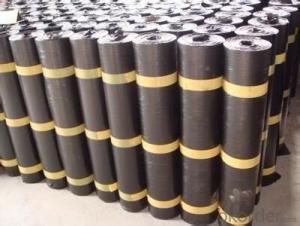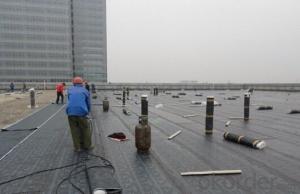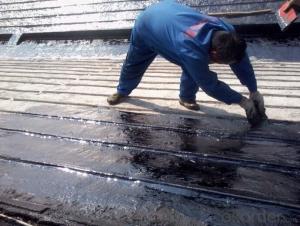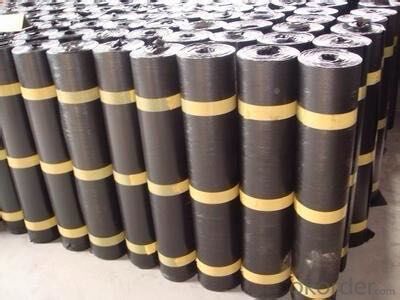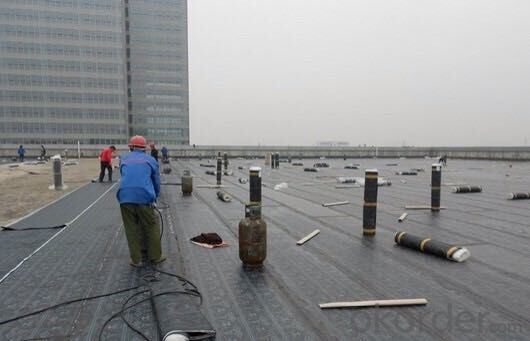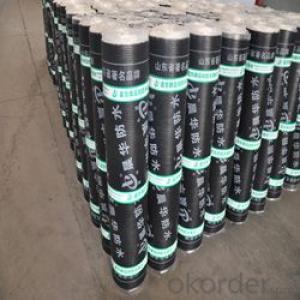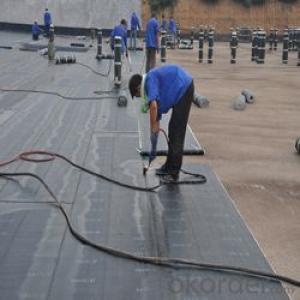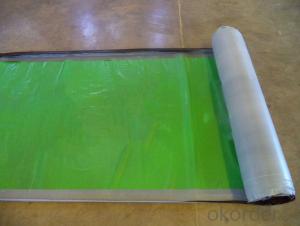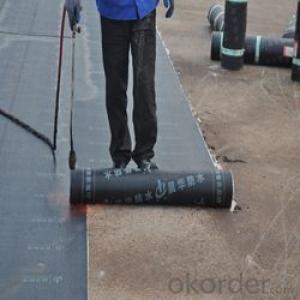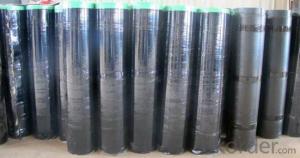Self adhesive SBS bitumen waterproof membrane
- Loading Port:
- Tianjin
- Payment Terms:
- TT OR LC
- Min Order Qty:
- 500 m²
- Supply Capability:
- 100000 m²/month
OKorder Service Pledge
OKorder Financial Service
You Might Also Like
Structure Of SBS Bitumen Waterproof Membrane Description
Self adhesive SBS bitumen waterproof membrane is produced with SBS elastomer and bitumen as raw materials, using polyethylene film. Aluminium foil coated on the upward or no file(both side self-adhesive) while self-adhesive protection layer on the downward surface.It has a widely prospect new contruction waterproof materials. Good self-adhesion, no leaking,cold flexibility,especially in self-adhesion. That is unique product in waterproof and application.
Main Features of the SBS Bitumen Waterproof Membrane
1. Self-adhesive without bonding agent and torching.
2. With good elasticity and elongation, can be used in -25 degree weather.
3. Easy and safe installation, and won't be effected by the weather, greatly reduce the construction period and the cost.
4. Environment protection product.
5. Corrosion resistance and ageing-resistance.
6. Available for wet ground.
SBS Bitumen Waterproof Membrane Images
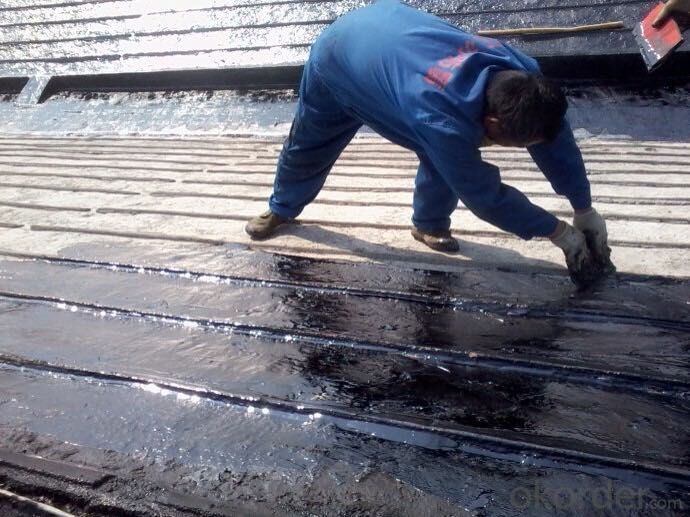
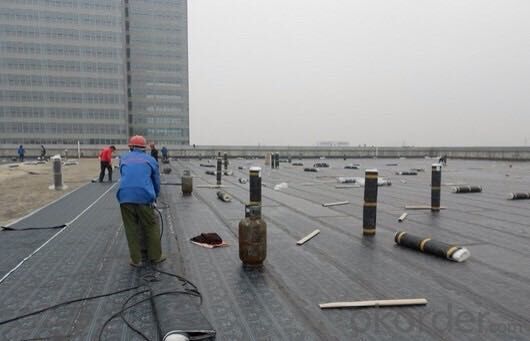
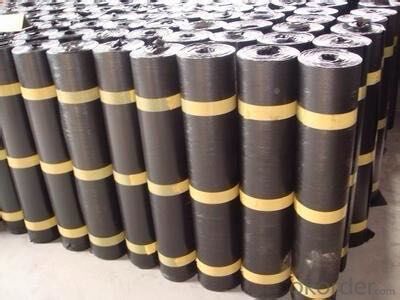
SBS Bitumen Waterproof Membrane Specifications:
1. Size: 1*10mm, 1*15mm, 1*20mm
2. Thickness: 1.5mm, 2.0mm, 3.0mm, 4.0mm
3. Weight: 25kgs, 26kgs, 32kgs, 38kgs.
4. Rolls in 1*20'GP: 800 rolls
FAQ Of SBS Bitumen Waterproof Membrane
1. What is the usage?
SBS/APP modified asphalt waterproofing membrane can be widely used for building surface and basement waterproof in industrial and civil engineering, as well as waterproof for subway, cold storage, airport runway and viaduct.
SBS modified asphalt waterproofing membrane is specially suitable to the architecture’s waterproofing in cold area and to the building of unstable constructions, while APP specially is suitable to areas of high temperature and of strong sunshine.
2. What is the application areas?
1. Balcony, bathroom, kitchen
2. Tunnels, Industrial roofs
3. Flat and sloped roofs
4. Basements, Foundation and retaining walls
5. Gardens, Bridges
- Q: Can a waterproofing membrane be used for concrete tank linings?
- Concrete tank linings can make use of waterproofing membranes, which are frequently employed in construction to obstruct water penetration and offer a protective shield. By applying a waterproofing membrane to the inner surfaces of a concrete tank, the infiltration of water and subsequent harm can be effectively averted. This becomes especially crucial for tanks that store fluids or chemicals, as any leakage can result in contamination or structural decay. By utilizing a waterproofing membrane, the tank can be shielded against water ingress, guaranteeing its durability and preserving its structural soundness.
- Q: Can a waterproofing membrane be used for seawalls or bulkheads?
- Yes, a waterproofing membrane can be used for seawalls or bulkheads. Waterproofing membranes are designed to provide a barrier against water penetration and can be applied to various structures, including seawalls and bulkheads. These membranes are typically made of materials such as bitumen, rubber, PVC, or polyurethane, which offer excellent resistance to water and ensure the structural integrity of the wall or bulkhead. The membrane is applied to the surface of the structure, forming a continuous and durable waterproof layer that prevents water from seeping through. This helps protect the seawall or bulkhead from erosion, corrosion, and other forms of damage caused by exposure to seawater. Additionally, waterproofing membranes can also provide additional benefits such as increased durability, improved aesthetics, and enhanced resistance to UV rays and chemicals. Overall, the use of a waterproofing membrane is an effective solution for ensuring the long-term performance and durability of seawalls and bulkheads in marine environments.
- Q: Can a waterproofing membrane be used for residential buildings or homes?
- Residential buildings or homes can indeed benefit from the use of a waterproofing membrane. Construction commonly relies on waterproofing membranes to safeguard against water infiltration, shielding both the structure and interior from moisture-induced harm. These versatile membranes find application in diverse areas like basements, roofs, foundations, and bathrooms, among others. By effectively blocking water, these membranes effectively thwart leaks, mold proliferation, and deterioration of building materials. Consequently, employing a waterproofing membrane proves highly efficacious in safeguarding the longevity and durability of residential buildings or homes.
- Q: Can a waterproofing membrane be used for an industrial facility?
- An industrial facility can utilize a waterproofing membrane. Such a membrane is a layer of protection that is applied to surfaces in order to prevent water from penetrating and causing moisture damage. Industrial facilities, including manufacturing plants, warehouses, and processing plants, often require effective waterproofing to safeguard their structures, equipment, and inventory against water damage. Industrial facilities commonly face exposure to various water sources, such as rain, leaks, or spills. Additionally, these facilities may experience high humidity levels or engage in water-intensive processes. By using waterproofing membranes, a reliable barrier against water intrusion can be established, thereby preventing damage and corrosion to the facility's structure, machinery, and products. Waterproofing membranes are designed to be durable and long-lasting, capable of withstanding harsh industrial conditions and heavy traffic or equipment. They come in different materials, such as bitumen, PVC, EPDM, or polyurethane, providing flexibility in selecting the most appropriate membrane for specific industrial applications. Moreover, waterproofing membranes offer additional advantages beyond water resistance. Certain membranes possess insulation properties, aiding in temperature regulation and reducing energy consumption. They can also enhance the overall safety and hygiene of an industrial facility by inhibiting the growth of mold, mildew, or bacteria that thrive in damp environments. To conclude, the utilization of a waterproofing membrane can prove highly effective in safeguarding an industrial facility from water damage. It establishes a dependable barrier against water intrusion, ensuring the facility's longevity and functionality while protecting valuable assets within it.
- Q: Can a waterproofing membrane be used for roofs with foot traffic?
- Indeed, it is possible to utilize a waterproofing membrane for roofs that experience foot traffic. Nevertheless, it is imperative to select a membrane that is specifically engineered and classified for foot traffic. Usually, these membranes incorporate sturdier materials like reinforced PVC or modified bitumen, enabling them to endure the constant wear and tear resulting from regular foot traffic. Moreover, it is of utmost importance to guarantee the proper installation and maintenance of the membrane, so as to avert any potential harm or leakage that may undermine its waterproofing capacity. Consistent inspections and essential repairs must be conducted to guarantee the long-lasting and efficient performance of the membrane.
- Q: Can a waterproofing membrane be used on plastic block surfaces?
- Yes, a waterproofing membrane can be used on plastic block surfaces. These membranes are designed to provide a protective barrier against moisture, preventing water from seeping through the surface. Plastic blocks, like any other surface, can be susceptible to water damage if not properly protected. Applying a waterproofing membrane can help seal and protect the plastic blocks, preventing water penetration and potential damage. It is important to choose a waterproofing membrane that is compatible with plastic materials and follow the manufacturer's instructions for application to ensure the best results.
- Q: Can a waterproofing membrane be used for swimming pool coping?
- No, a waterproofing membrane is not typically used for swimming pool coping. Coping refers to the materials used to cap the edge of a swimming pool, such as tiles or stones. While a waterproofing membrane may be used to seal and protect the pool shell, it is not designed to serve as a coping material.
- Q: Can a waterproofing membrane be used on stadium seating areas?
- Yes, a waterproofing membrane can be used on stadium seating areas to provide protection against water damage and ensure the longevity of the seating structure.
- Q: Are there any specific installation techniques for corners and edges when using a waterproofing membrane?
- Yes, when installing a waterproofing membrane on corners and edges, it is important to follow specific techniques. First, ensure that the membrane extends beyond the corner or edge by at least 6 inches to provide adequate coverage. Next, carefully fold and crease the membrane to create a tight seal around the corner or edge. Use a heat gun or adhesive to secure the folded membrane in place. Additionally, apply a layer of sealant or waterproofing tape over the folded membrane to further reinforce the corner or edge. These techniques help prevent water penetration and ensure effective waterproofing in these vulnerable areas.
- Q: How does a waterproofing membrane handle settlement cracks?
- Waterproofing membranes are specifically designed to address settlement cracks by offering a continuous and flexible barrier that effectively blocks water infiltration. Settlement cracks arise when the ground beneath a structure shifts or settles, resulting in foundation cracks. These cracks can allow water to seep into the building, causing moisture damage and potential structural problems. In the event of a settlement crack, applying a waterproofing membrane to the affected area creates a seamless and watertight seal. This membrane acts as a protective layer that prevents water from entering through the crack and penetrating the building. Furthermore, it plays a vital role in maintaining the foundation's structural integrity by reducing the likelihood of additional cracking and deterioration. The flexibility of the waterproofing membrane is essential in handling settlement cracks. It can accommodate the movements of the underlying structure without compromising its performance. As the ground settles or shifts, the membrane stretches and contracts, ensuring that the crack remains sealed and the waterproofing system remains intact. Moreover, certain waterproofing membranes possess self-healing properties. This means that if a settlement crack does occur, the membrane has the ability to reseal itself, preserving its watertight integrity. This self-healing capability minimizes the need for frequent repairs and maintenance, leading to time and cost savings for property owners. In conclusion, a waterproofing membrane is a highly effective solution for addressing settlement cracks. It provides a durable and flexible barrier that prevents water infiltration, guards against further damage, and contributes to the longevity of the structure.
Send your message to us
Self adhesive SBS bitumen waterproof membrane
- Loading Port:
- Tianjin
- Payment Terms:
- TT OR LC
- Min Order Qty:
- 500 m²
- Supply Capability:
- 100000 m²/month
OKorder Service Pledge
OKorder Financial Service
Similar products
Hot products
Hot Searches
Related keywords
